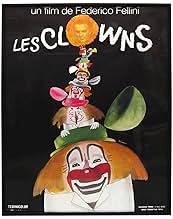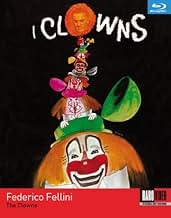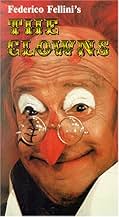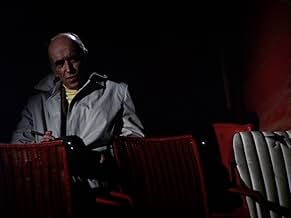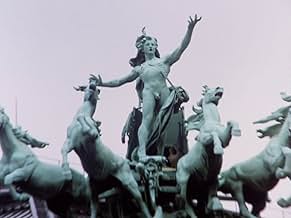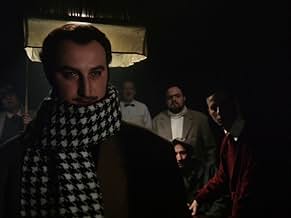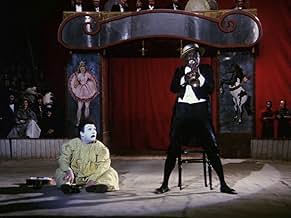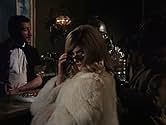AVALIAÇÃO DA IMDb
7,0/10
3,1 mil
SUA AVALIAÇÃO
Muitas memórias reais e documentário falso, enquanto Fellini explora uma obsessão infantil: palhaços de circo.Muitas memórias reais e documentário falso, enquanto Fellini explora uma obsessão infantil: palhaços de circo.Muitas memórias reais e documentário falso, enquanto Fellini explora uma obsessão infantil: palhaços de circo.
- Prêmios
- 4 vitórias e 2 indicações no total
Riccardo Billi
- Clown
- (as Billi)
Gigi Reder
- Clown
- (as Reder)
Tino Scotti
- Clown
- (as Scotti)
Carlo Rizzo
- Clown
- (as Rizzo)
Alberto Colombaioni
- Clown
- (as I 4 Colombaioni)
Giacomo Furia
- Clown
- (as Furia)
Dante Maggio
- Clown
- (as Maggio)
Galliano Sbarra
- Clown
- (as Sbarra)
Peppino Janigro
- Clown
- (as Janigro)
Nino Terzo
- Clown
- (as Terzo)
Osiride Pevarello
- Clown
- (as Peverello)
- Direção
- Roteiristas
- Elenco e equipe completos
- Produção, bilheteria e muito mais no IMDbPro
Enredo
Você sabia?
- CuriosidadesThis film has a 100% rating based on 19 critic reviews on Rotten Tomatoes.
- ConexõesEdited into Fellini's Circus (2011)
Avaliação em destaque
As far back as I can remember, I was always scared by clowns. Literally, my "coulrophobia" (that's the right word) happens to be my first life's episode I ever remember. So, allow me to start this review like Fellini did in his semi-documentary "I Clowns".
My first encounter with clowns was on TV (still a big screen from children's eyes) and being a sickly timid boy, I have always been unsettled by abnormality, let alone these creepy chalky faces with bright make-up. A few days later, during my 3rd birthday party, I saw one of my cousins being made-up as a clown and as fast as I could, I ran immediately to my aunt's knee and pretended to sleep, forcing my eyes to stay closed. Clowns became the incarnation of a devil I ignored all about.
And they were everywhere, I could hear their irritating voices on circus TV programs, watch them bullying poor "Dumbo", or hanging in these ugly paintings. The year after the birthday episode, my school's holiday party featured the two most famous clowns of my country. And I had to hide somewhere waiting for my Dad to take me, but the nightmare wasn't over yet: the same night, he bought me a 'memory' card game, and guess what? There were clowns there too, especially one picture that scared me so much I didn't even have the courage to throw it, I only left in a drawer. My cousin, who knew about my phobia, found it one day, and put it right before my eyes, laughing hysterically.
And I still remember the nightmares that picture gave me. Well, you got the point, clowns can truly affect a child, and coulrophobia is no joke. So, I could easily respond to the kid's traumatic experience in the opening sequence of Fellini"s "I Clowns". Their shadowy silhouettes as soon as the fanfare starts seemed to announce an ominous coming and as soon as they get in the spotlight for a four or five minutes of grotesque mayhem and ugliness, epitomizing everything I hated about them, I wanted the show to stop. Thanks, lord, I wasn't the only one, Fellini was scared by clowns, and hell, even Bart Simpson, the coolest boy ever, didn't want to sleep, fearing that the creepy clown-like bed would eat him.
My phobia slowly faded out, and I started to look at clowns more like pathetic characters, supposed to make us laugh of their ridicule aspect. And the point of Fellini's documentary is to try to understand the psychological roots of those half-repulsion half-fascination reactions clowns generally inspire. The study starts by exploring the probable causes of the child's fear: clowns reminded him of real eccentric people from the neighborhood: retarded, buffoons, creeps, freaks, genuinely hideous and irritating, but their personalities was even scarier because they were real while clowns are not.
Clowns are rooted in theater's history; their masks embody the least noble of human condition, allowing us to laugh at them, instead of fearing them. They have a cathartic power that probably inspired most of Fellini's approach to life. As I titled in my review of "Amarcord", we're all clowns in the big top of life. And Fellini's world can be regarded as a great circus, where the protagonists are all trapped in their own clowns' masks, while we watch their show. A clown can be a prankster, naive, well-mannered or mean-spirited, the purpose is to make us laugh, as if the ultimate aspect of life was absurdity and if life is all a joke, let's end with a fitting punch-line. That's the core of Fellini's philosophy.
And Fellini is the Ringleader of this Circus, driven by Nino Rota's turbulent fanfares. And only Fellini could have made such a jovial and poignant tribute, exploring in a semi-documentary format (he plays his own role) the historical steps that forged the clowns' archetypes. From Comedia del Arte's pantomimes, Pierrot's eternal figure, and some personal creations, two preeminent figures will emerge and constitute the pattern of most clowns' shows: the gentle and clumsy Auguste, and the elegant, sophisticated and serious white-faced clown, the obligatory straight man. Basically, all the clowns' icons: Medrano, Zavata, Bozo or those who scared the hell out of you as children, carried the essence of today's comedy.
There are a lot of insightful moments in "I Clowns", which works as an educational film. It doesn't provide a definite answer about clowns, but only a sad report on today's detachment. The last climactic sequence where veteran clowns (who've been interviewed before) pay tribute to a late colleague whose name sunk into oblivion is the perfect illustration of that loneliness innate to the clowns reflecting our own cruelty. I almost felt guilty for having hated them so much, and I like to picture them as misunderstood outcasts. A film about them was long overdue, and only Fellini could have made such a vivid, absorbing portrayal, almost working on a self-referential level.
Indeed, look at that head-shot on IMDb, it's probably the most eloquent illustration of Fellini's vision: he's half a clown, half a man. He incarnates this duality that prevails in clowns, both as the creators of their own caricatures, as artists, and victims of it, as men. And their conditions are driven by the audiences, and sometimes, meaner and more cruel than any clown in any number. The fate of "Gelsomina" in "La Strada" is the most tragic illustration of clown's conditions. And after the film, I guess I had more respect to clowns for their daringness to embody the unpleasant traits of human condition.
But from that courage blooms something absolutely endearing and irresistible, elevating the notion of clown to a state-of-mind. It's not just about make-ups and circuses, Fellini, just like Chaplin, was a clown, embodying the only real truth about life: it a serious thing that shouldn't be taken seriously.
And when you get that, you can get any Fellini's film.
My first encounter with clowns was on TV (still a big screen from children's eyes) and being a sickly timid boy, I have always been unsettled by abnormality, let alone these creepy chalky faces with bright make-up. A few days later, during my 3rd birthday party, I saw one of my cousins being made-up as a clown and as fast as I could, I ran immediately to my aunt's knee and pretended to sleep, forcing my eyes to stay closed. Clowns became the incarnation of a devil I ignored all about.
And they were everywhere, I could hear their irritating voices on circus TV programs, watch them bullying poor "Dumbo", or hanging in these ugly paintings. The year after the birthday episode, my school's holiday party featured the two most famous clowns of my country. And I had to hide somewhere waiting for my Dad to take me, but the nightmare wasn't over yet: the same night, he bought me a 'memory' card game, and guess what? There were clowns there too, especially one picture that scared me so much I didn't even have the courage to throw it, I only left in a drawer. My cousin, who knew about my phobia, found it one day, and put it right before my eyes, laughing hysterically.
And I still remember the nightmares that picture gave me. Well, you got the point, clowns can truly affect a child, and coulrophobia is no joke. So, I could easily respond to the kid's traumatic experience in the opening sequence of Fellini"s "I Clowns". Their shadowy silhouettes as soon as the fanfare starts seemed to announce an ominous coming and as soon as they get in the spotlight for a four or five minutes of grotesque mayhem and ugliness, epitomizing everything I hated about them, I wanted the show to stop. Thanks, lord, I wasn't the only one, Fellini was scared by clowns, and hell, even Bart Simpson, the coolest boy ever, didn't want to sleep, fearing that the creepy clown-like bed would eat him.
My phobia slowly faded out, and I started to look at clowns more like pathetic characters, supposed to make us laugh of their ridicule aspect. And the point of Fellini's documentary is to try to understand the psychological roots of those half-repulsion half-fascination reactions clowns generally inspire. The study starts by exploring the probable causes of the child's fear: clowns reminded him of real eccentric people from the neighborhood: retarded, buffoons, creeps, freaks, genuinely hideous and irritating, but their personalities was even scarier because they were real while clowns are not.
Clowns are rooted in theater's history; their masks embody the least noble of human condition, allowing us to laugh at them, instead of fearing them. They have a cathartic power that probably inspired most of Fellini's approach to life. As I titled in my review of "Amarcord", we're all clowns in the big top of life. And Fellini's world can be regarded as a great circus, where the protagonists are all trapped in their own clowns' masks, while we watch their show. A clown can be a prankster, naive, well-mannered or mean-spirited, the purpose is to make us laugh, as if the ultimate aspect of life was absurdity and if life is all a joke, let's end with a fitting punch-line. That's the core of Fellini's philosophy.
And Fellini is the Ringleader of this Circus, driven by Nino Rota's turbulent fanfares. And only Fellini could have made such a jovial and poignant tribute, exploring in a semi-documentary format (he plays his own role) the historical steps that forged the clowns' archetypes. From Comedia del Arte's pantomimes, Pierrot's eternal figure, and some personal creations, two preeminent figures will emerge and constitute the pattern of most clowns' shows: the gentle and clumsy Auguste, and the elegant, sophisticated and serious white-faced clown, the obligatory straight man. Basically, all the clowns' icons: Medrano, Zavata, Bozo or those who scared the hell out of you as children, carried the essence of today's comedy.
There are a lot of insightful moments in "I Clowns", which works as an educational film. It doesn't provide a definite answer about clowns, but only a sad report on today's detachment. The last climactic sequence where veteran clowns (who've been interviewed before) pay tribute to a late colleague whose name sunk into oblivion is the perfect illustration of that loneliness innate to the clowns reflecting our own cruelty. I almost felt guilty for having hated them so much, and I like to picture them as misunderstood outcasts. A film about them was long overdue, and only Fellini could have made such a vivid, absorbing portrayal, almost working on a self-referential level.
Indeed, look at that head-shot on IMDb, it's probably the most eloquent illustration of Fellini's vision: he's half a clown, half a man. He incarnates this duality that prevails in clowns, both as the creators of their own caricatures, as artists, and victims of it, as men. And their conditions are driven by the audiences, and sometimes, meaner and more cruel than any clown in any number. The fate of "Gelsomina" in "La Strada" is the most tragic illustration of clown's conditions. And after the film, I guess I had more respect to clowns for their daringness to embody the unpleasant traits of human condition.
But from that courage blooms something absolutely endearing and irresistible, elevating the notion of clown to a state-of-mind. It's not just about make-ups and circuses, Fellini, just like Chaplin, was a clown, embodying the only real truth about life: it a serious thing that shouldn't be taken seriously.
And when you get that, you can get any Fellini's film.
- ElMaruecan82
- 29 de ago. de 2013
- Link permanente
Principais escolhas
Faça login para avaliar e ver a lista de recomendações personalizadas
Detalhes
Bilheteria
- Faturamento bruto mundial
- US$ 284
- Tempo de duração1 hora 32 minutos
- Mixagem de som
- Proporção
- 1.33 : 1
Contribua para esta página
Sugerir uma alteração ou adicionar conteúdo ausente

Principal brecha
By what name was Os Palhaços (1970) officially released in Canada in English?
Responda
